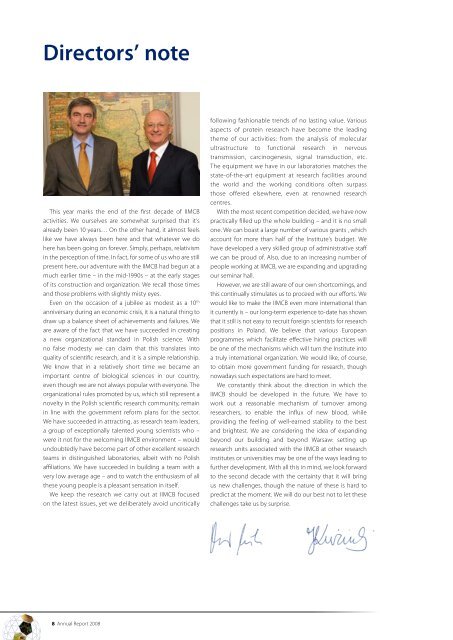10 A niversary of IIMCB
10 A niversary of IIMCB
10 A niversary of IIMCB
Create successful ePaper yourself
Turn your PDF publications into a flip-book with our unique Google optimized e-Paper software.
Directors’ note<br />
This year marks the end <strong>of</strong> the first decade <strong>of</strong> <strong>IIMCB</strong><br />
activities. We ourselves are somewhat surprised that it’s<br />
already been <strong>10</strong> years… On the other hand, it almost feels<br />
like we have always been here and that whatever we do<br />
here has been going on forever. Simply, perhaps, relativism<br />
in the perception <strong>of</strong> time. In fact, for some <strong>of</strong> us who are still<br />
present here, our adventure with the <strong>IIMCB</strong> had begun at a<br />
much earlier time – in the mid-1990s – at the early stages<br />
<strong>of</strong> its construction and organization. We recall those times<br />
and those problems with slightly misty eyes.<br />
Even on the occasion <strong>of</strong> a jubilee as modest as a <strong>10</strong> th<br />
an<strong>niversary</strong> during an economic crisis, it is a natural thing to<br />
draw up a balance sheet <strong>of</strong> achievements and failures. We<br />
are aware <strong>of</strong> the fact that we have succeeded in creating<br />
a new organizational standard in Polish science. With<br />
no false modesty we can claim that this translates into<br />
quality <strong>of</strong> scientific research, and it is a simple relationship.<br />
We know that in a relatively short time we became an<br />
important centre <strong>of</strong> biological sciences in our country,<br />
even though we are not always popular with everyone. The<br />
organizational rules promoted by us, which still represent a<br />
novelty in the Polish scientific research community, remain<br />
in line with the government reform plans for the sector.<br />
We have succeeded in attracting, as research team leaders,<br />
a group <strong>of</strong> exceptionally talented young scientists who –<br />
were it not for the welcoming <strong>IIMCB</strong> environment – would<br />
undoubtedly have become part <strong>of</strong> other excellent research<br />
teams in distinguished laboratories, albeit with no Polish<br />
affiliations. We have succeeded in building a team with a<br />
very low average age – and to watch the enthusiasm <strong>of</strong> all<br />
these young people is a pleasant sensation in itself.<br />
We keep the research we carry out at <strong>IIMCB</strong> focused<br />
on the latest issues, yet we deliberately avoid uncritically<br />
8 Annual Report 2008<br />
following fashionable trends <strong>of</strong> no lasting value. Various<br />
aspects <strong>of</strong> protein research have become the leading<br />
theme <strong>of</strong> our activities: from the analysis <strong>of</strong> molecular<br />
ultrastructure to functional research in nervous<br />
transmission, carcinogenesis, signal transduction, etc.<br />
The equipment we have in our laboratories matches the<br />
state-<strong>of</strong>-the-art equipment at research facilities around<br />
the world and the working conditions <strong>of</strong>ten surpass<br />
those <strong>of</strong>fered elsewhere, even at renowned research<br />
centres.<br />
With the most recent competition decided, we have now<br />
practically filled up the whole building – and it is no small<br />
one. We can boast a large number <strong>of</strong> various grants , which<br />
account for more than half <strong>of</strong> the Institute’s budget. We<br />
have developed a very skilled group <strong>of</strong> administrative staff<br />
we can be proud <strong>of</strong>. Also, due to an increasing number <strong>of</strong><br />
people working at <strong>IIMCB</strong>, we are expanding and upgrading<br />
our seminar hall.<br />
However, we are still aware <strong>of</strong> our own shortcomings, and<br />
this continually stimulates us to proceed with our efforts. We<br />
would like to make the <strong>IIMCB</strong> even more international than<br />
it currently is – our long-term experience to-date has shown<br />
that it still is not easy to recruit foreign scientists for research<br />
positions in Poland. We believe that various European<br />
programmes which facilitate effective hiring practices will<br />
be one <strong>of</strong> the mechanisms which will turn the Institute into<br />
a truly international organization. We would like, <strong>of</strong> course,<br />
to obtain more government funding for research, though<br />
nowadays such expectations are hard to meet.<br />
We constantly think about the direction in which the<br />
<strong>IIMCB</strong> should be developed in the future. We have to<br />
work out a reasonable mechanism <strong>of</strong> turnover among<br />
researchers, to enable the influx <strong>of</strong> new blood, while<br />
providing the feeling <strong>of</strong> well-earned stability to the best<br />
and brightest. We are considering the idea <strong>of</strong> expanding<br />
beyond our building and beyond Warsaw: setting up<br />
research units associated with the <strong>IIMCB</strong> at other research<br />
institutes or universities may be one <strong>of</strong> the ways leading to<br />
further development. With all this in mind, we look forward<br />
to the second decade with the certainty that it will bring<br />
us new challenges, though the nature <strong>of</strong> these is hard to<br />
predict at the moment. We will do our best not to let these<br />
challenges take us by surprise.








